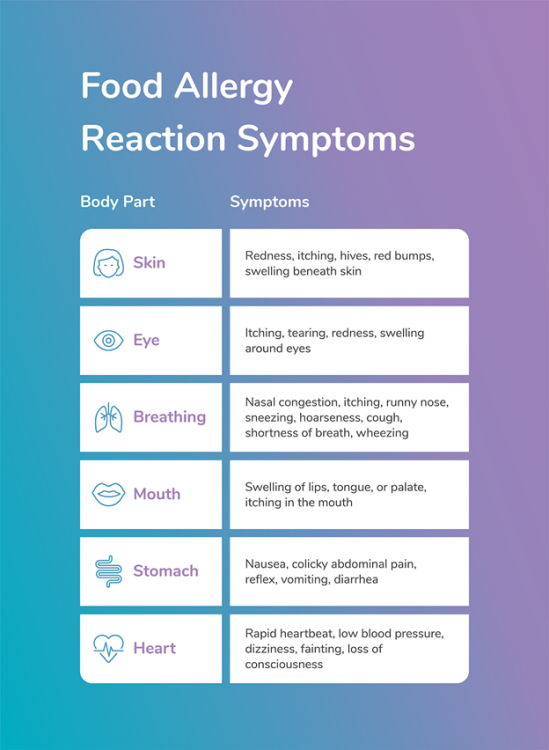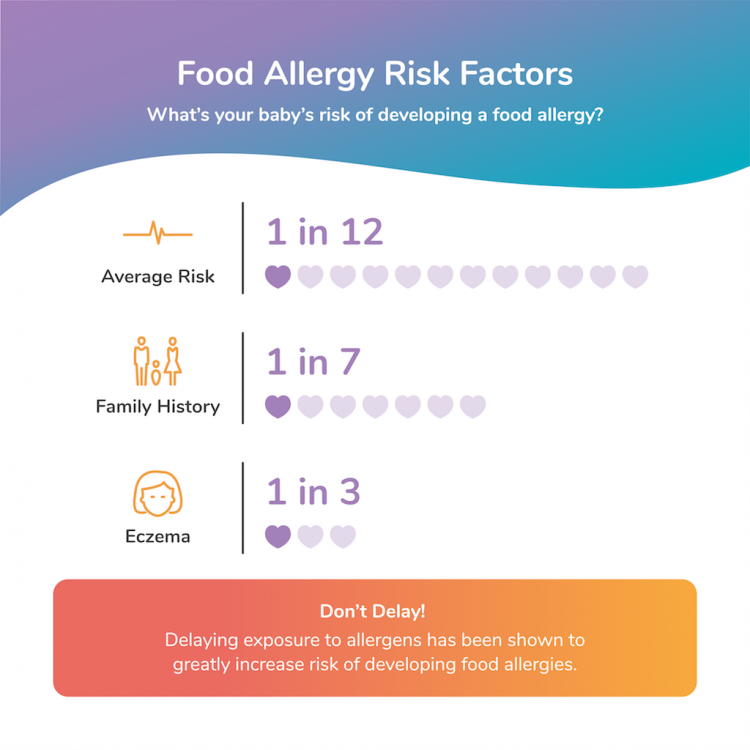We’re excited to partner with Ready, Set, Food! to bring you important information about food allergies in children.
Here’s what you’ll learn in this article:
- What is a food allergy and how to identify symptoms of an allergic reaction
- How common food allergies are today
- What babies are most at risk for developing food allergies
- How to prevent up to 80% of food allergies
With more than 50 million Americans suffering from a food allergy today, chances are that if you don’t have a food allergy yourself, you might know someone who does. And now that you’re a parent, you might be wondering about what this means for your child, and if there’s anything you can do to help prevent them from getting food allergies. The good news is, recent studies show that you may be able to do just that.
What is a food allergy?
A food allergy is an immune system response to a certain allergen that’s eaten. This immune system response is triggered when the immune system mistakenly responds to certain foods that it thinks are harmful. Essentially, a food allergy is when our immune system over-defends and treats certain proteins in foods, called allergens, as foreign invaders — the allergic reaction happens when our body tries to fight the allergens off.
The U.S. Food and Drug Administration (FDA) identifies the top eight food allergens as being: milk, egg, peanut, tree nuts, shellfish, fish, wheat and soy. However, egg, milk, and peanut combined represent over 80% of childhood food allergies.
Symptoms of an allergic reaction
The most common symptoms of an allergic reaction in babies are hives and vomiting, and these occur within 2 hours of eating the allergenic food, but most often they occur within seconds or minutes. There are a number of other symptoms that can occur too:

Food allergy reactions can be unpredictable, and a reaction can vary widely from one person to another. And when the symptoms are severe enough and involve more than one organ system, it’s classified as anaphylaxis, a situation that can be life threatening.
The rise of food allergies
Most food allergies occur in childhood rather than in adults, and food allergies now affect one in twelve children, with the rates of peanut allergies tripling in recent decades. For children especially, food allergies can affect their quality of life. One in three children with a food allergy has been bullied as a direct result of having food allergies. Many children also face social exclusion and activity avoidance, as avoiding allergenic foods such as egg and milk at activities (like playdates or birthday parties) can be extremely isolating.
And food allergies can be even more serious, because even one accidental exposure could have life-threatening consequences. Every 3 minutes in the U.S. a food allergy reaction sends someone to the ER.
Is my baby at risk for developing food allergies?
Research shows that over 50% of children that suffer from a food allergy have no family history so every baby is at risk for developing food allergies. However, there a few different factors that parents need to be aware of that may put your baby at an even higher risk of developing food allergies.
- Eczema: Eczema is the most important risk factor to consider because up to 1 in 3 babies with eczema will develop a food allergy. You can learn more about this connection between eczema and food allergies at eczemababies.org.
- Family History: Family history can also increase your baby’s chances of developing a food allergy as 1 in 7 babies with a family history will develop a food allergy
- Delaying Allergen Introduction: Delaying allergen introduction can significantly increase your baby’s risk of developing a food allergy so it’s important to introduce allergenic foods starting at 4 months of age.

The good news? Early allergen introduction can make a big difference
Fortunately, recent clinical trials show that introducing allergens such as peanut, egg, and milk to babies early and often can prevent up 80% of food allergies. And guidelines from leading medical organizations such as the American Academy of Pediatrics (AAP), the National Institutes of Health (NIH), and the American Academy of Allergy, Asthma, and Immunology (AAAAI) support this, recommending that allergens be introduced at 4-11 months of age.
In fact, the 2020-2025 USDA Guidelines Report was just recently published and one of the key recommendations was that every baby should consume common allergy-causing foods such as peanut and egg starting at 4 months of age.
Following the new guidelines on food allergy prevention is an important way that every family — especially for babies at a higher risk for developing food allergies, including those with eczema — can lessen the risk for developing food allergies.
Ready, Set, Food! and their team of leading physicians are on a mission to help parents prevent 80% of food allergies with their easy, all-natural, safe early allergen introduction system.





You are right, food Allergy is a state of hypersensitivity of the body to food. Most often, this does not play a big role in everyday life, if the products that you are allergic to are very specific, such as shellfish. It is much worse if you are allergic to citrus or nuts, which are often part of many dishes or products. Fortunately, I have no allergies, and I can try dishes from different Chinese provinces, which makes me happy
Such an informative and interesting subject. I thank my lucky stars that my kids never had allergies because they can be a little random and very dangerous at times
This was a great read. Food allergies and food sensitivities are very different. I think it’s important to know what to look for in a food allergy. They can be very dangerous.
Forgive me, but I have to share a bit of our story. I have a very difficult time with this kind of advice particularly because my own son was born with his life-threatening food allergies. From the moment he entered this world and started to nurse, he was instantly covered with skin-breaking eczema, his tongue swelled, angioedema developed around his lips, he broke out in hives, and more. I craved eggs like they were going out of style and it was always in my breast milk. He is deathly allergic to them to this day. If I had listened to advice like this and had directly given him any of the allergens to which he is allergic now under the age of one, I have no doubt we would have lost him. In fact, no doctor believed us when we said we believe he has food allergies until he went anaphylactic in a restaurant on his very first birthday with a dime-sized piece of egg. So, if I may, my advice to parents with littles is to proceed with caution please. My son is the proof that infants under the age of one can have food allergies.
My twins had severe food allergies when they were younger. They also had major issues with gut health. As their gut health has improved, the severity of their food allergies has lessened. We still have certain things we have to avoid, but the list isn’t nearly as big as it was before!
I am allergic to milk, soy, and mushrooms. If I eat them, within 20 minutes, I have an asthma attack
Thank you for defining a food allergy. While I don’t have any allergies, I have several friends and family that do. It is helpful to know what to do in the event of a food allergy too!
This helps a lot with distinguishing the difference between and allergy and an intolerance. The former sounds more serious!
Food allergies can be so scary. I’m very grateful that no one in my family has a food allergy.
We recently discovered our youngest has a food allergy. It was a shocked since no one in the family has the allergy.
This is really informative. think it is really important to be aware of food allergies.
Our family does not have any known food allergies. It’s great that there is so much awareness now because food allergies for kids felt very different not many years ago.
Such a very interesting topic and very essentials to individual especially those who has allergy in food. Everybody should know if they have allergy on certain food as this means sometimes a life threatening situation.
Food allergies are something we need to be aware of, even if we do not have any.
Having guests, visiting friends of our children made me to prepare foods in a much different way.
Great job on this post, very informative,
I will share this with others. I’m sure it will be helpful.